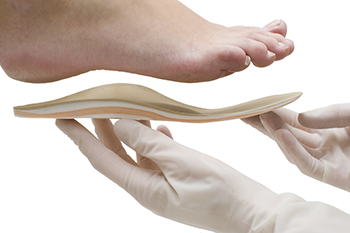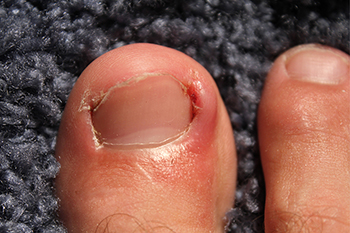Items filtered by date: February 2023
A Successful Treatment Method for a Broken Toe

A broken toe is a common injury. The bones in the toe can be easier to fracture than other bones because they are at the end of the body. A toe can be stubbed by a piece of furniture or break from a heavy object falling on it. The medical condition known as osteoporosis is defined as a thinning and weakening of the bones and may be an additional cause of a broken toe. Symptoms often include severe pain, bruising or swelling, and it may become difficult to walk. A severely broken toe might have a bone that protrudes through the skin requiring prompt medical attention. An X-ray is generally performed to determine the extent of the fracture. The buddy-taping method may be implemented for a mildly broken toe. This is done by taping the affected toe to the toe next to it. This can provide adequate support as the healing process occurs. If you have broken your toe, it is suggested that you confer with a podiatrist who can help you with the correct treatment methods.
Broken toes may cause a lot of pain and should be treated as soon as possible. If you have any concerns about your feet, contact Gary Cockrell, DPM from Tennessee. Our doctor will treat your foot and ankle needs.
What Is a Broken Toe?
A broken toe occurs when one or more of the toe bones of the foot are broken after an injury. Injuries such as stubbing your toe or dropping a heavy object on it may cause a toe fracture.
Symptoms of a Broken Toe
- Swelling
- Pain (with/without wearing shoes)
- Stiffness
- Nail Injury
Although the injured toe should be monitored daily, it is especially important to have a podiatrist look at your toe if you have severe symptoms. Some of these symptoms include worsening or new pain that is not relieved with medication, sores, redness, or open wounds near the toe.
If you have any questions, please feel free to contact our offices located in Brentwood and Madison, TN . We offer the newest diagnostic and treatment technologies for all your foot care needs.
Orthotics Versus Prosthetics

Some patients may not be fully familiar with the similarities and differences between orthotics and prosthetics. While both can be used to treat conditions of the feet, they are significantly different. Importantly, prosthetic devices in this context are mostly artificial legs. These devices can be used if an individual has lost a leg, perhaps by amputation. Orthotics, on the other hand, are either custom-made or over-the-counter shoe inserts that are designed to treat specific conditions of the feet. Therefore, both orthotics and prosthetics are significantly different medical devices. However, they are also similar in some respects. Namely, both orthotics and prosthetics can help individuals with serious health conditions to live lives that are better and less restrictive. It is suggested that you contact a podiatrist for more information about these devices.
If you are having discomfort in your feet and would like to try orthotics, contact Gary Cockrell, DPM from Tennessee. Our doctor can provide the care you need to keep you pain-free and on your feet.
What Are Orthotics?
Orthotics are inserts you can place into your shoes to help with a variety of foot problems such as flat feet or foot pain. Orthotics provide relief and comfort for minor foot and heel pain but can’t correct serious biomechanical problems in your feet.
Over-the-Counter Inserts
Orthotics come in a wide variety of over-the-counter inserts that are used to treat foot pain, heel pain, and minor problems. For example, arch supports can be inserted into your shoes to help correct overarched or flat feet, while gel insoles are often used because they provide comfort and relief from foot and heel pain by alleviating pressure.
Prescription Orthotics
If over-the-counter inserts don’t work for you or if you have a more severe foot concern, it is possible to have your podiatrist prescribe custom orthotics. These high-quality inserts are designed to treat problems such as abnormal motion, plantar fasciitis, and severe forms of heel pain. They can even be used to help patients suffering from diabetes by treating foot ulcers and painful calluses and are usually molded to your feet individually, which allows them to provide full support and comfort.
If you are experiencing minor to severe foot or heel pain, it’s recommended to speak with your podiatrist about the possibilities of using orthotics. A podiatrist can determine which type of orthotic is right for you and allow you to take the first steps towards being pain-free.
If you have any questions please contact our offices located in Brentwood and Madison, TN . We offer the newest diagnostic and treatment technologies for all your foot and ankle needs.
Proper Treatment for Ingrown Toenails

There are two common reasons why ingrown toenails may develop. It is a painful foot condition that can occur from improperly trimming the toenails or from wearing shoes that are too tight. It is easy to notice as the nail grows into the skin instead of over it. It is often red and swollen, and may ooze if prompt medical attention is not sought. Temporary relief may be found when the nail is soaked in warm water. This can be followed by gently pulling the affected nail away from the skin. Professional medical advice comes from a podiatrist, who can offer correct treatment methods. This is necessary if the ingrown toenail is severe, infected, or if there are existing medical conditions such as diabetes and circulation problems. If you have developed an ingrown toenail, it is strongly advised that you speak with a podiatrist who can provide adequate treatment, which may include surgery for partial or total nail removal.
Ingrown toenails can become painful if they are not treated properly. For more information about ingrown toenails, contact Gary Cockrell, DPM of Tennessee. Our doctor can provide the care you need to keep you pain-free and on your feet.
Ingrown Toenails
Ingrown toenails occur when a toenail grows sideways into the bed of the nail, causing pain, swelling, and possibly infection.
Causes
- Bacterial infections
- Improper nail cutting such as cutting it too short or not straight across
- Trauma to the toe, such as stubbing, which causes the nail to grow back irregularly
- Ill-fitting shoes that bunch the toes too close together
- Genetic predisposition
Prevention
Because ingrown toenails are not something found outside of shoe-wearing cultures, going barefoot as often as possible will decrease the likeliness of developing ingrown toenails. Wearing proper fitting shoes and using proper cutting techniques will also help decrease your risk of developing ingrown toenails.
Treatment
Ingrown toenails are a very treatable foot condition. In minor cases, soaking the affected area in salt or antibacterial soaps will not only help with the ingrown nail itself, but also help prevent any infections from occurring. In more severe cases, surgery is an option. In either case, speaking to your podiatrist about this condition will help you get a better understanding of specific treatment options that are right for you.
If you have any questions please feel free to contact our offices located in Brentwood and Madison, TN . We offer the newest diagnostic and treatment technologies for all your foot and ankle needs.
Arthritis Can Cause Pain in the Feet and Ankles
Stress Fractures Can Happen in Different Parts of the Foot

A stress fracture of the foot can wreak havoc on completing daily activities. It is considered to be a hairline fracture and occurs as a result of overuse from frequently running. The pain from a stress fracture may begin as achiness, and many avid runners tend to ignore this. This can gradually develop into having severe pain, which may force the patient to temporarily cease the offending activity. Stress fractures of the foot are divided into four categories. A metatarsal stress fracture, considered to be the most common, happens in the second metatarsal. Additionally, stress fractures may occur in the heel, sesamoid, and navicular bones, all of which cause pain and discomfort. Stress fractures may also happen from increasing speed and distance too quickly, or running on uneven surfaces. After a diagnosis is performed, which typically involves having an X-ray or other imaging test taken, proper treatment can begin. If you feel you have a stress fracture, it is strongly advised that you speak with a podiatrist who can fit you with a protective boot, and prescribe custom-made orthotics, if necessary.
Stress fractures occur when there is a tiny crack within a bone. To learn more, contact Gary Cockrell, DPM from Tennessee. Our doctor can provide the care you need to keep you pain free and on your feet.
How Are They Caused?
Stress fractures are the result of repetitive force being placed on the bone. Since the lower leg and feet often carry most of the body’s weight, stress fractures are likely to occur in these areas. If you rush into a new exercise, you are more likely to develop a stress fracture since you are starting too much, too soon. Pain resulting from stress fractures may go unnoticed at first, however it may start to worsen over time.
Risk Factors
- Gender – They are more commonly found in women compared to men.
- Foot Problems – People with unusual arches in their feet are more likely to develop stress fractures.
- Certain Sports – Dancers, gymnasts, tennis players, runners, and basketball players are more likely to develop stress fractures.
- Lack of Nutrients – A lack of vitamin D and calcium may weaken the bones and make you more prone to stress fractures
- Weak Bones – Osteoporosis can weaken the bones therefore resulting in stress fractures
Stress fractures do not always heal properly, so it is important that you seek help from a podiatrist if you suspect you may have one. Ignoring your stress fracture may cause it to worsen, and you may develop chronic pain as well as additional fractures.
If you have any questions, please feel free to contact our offices located in Brentwood and Madison, TN . We offer the newest diagnostic and treatment technologies for all your foot care needs.

